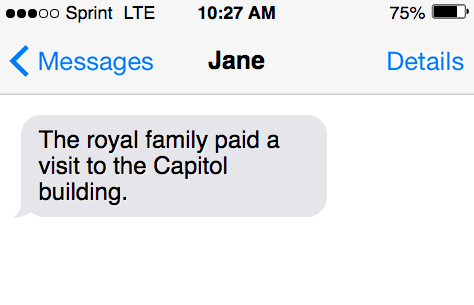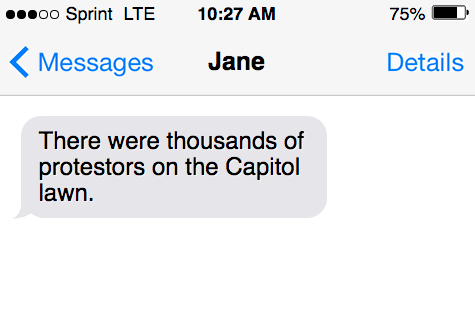Many words possess similar appearances. It confuses and frustrates individuals in most cases. These words are referred to as homophones. They sound alike and look alike, although hold entirely different meanings.
Semantic variations do go a long way in reducing the chances of confusion. For instance, let’s take a look at these words – ‘Ascent’ and ‘Assent.’
Here, assent can either be a noun or a verb. As a verb it can mean ‘to agree,’ and as a noun, it can refer to as an ‘agreeing act.’
However, the word ‘ascent’ only comes in the form of a noun. Some of its meanings are ‘progress,’ ‘climb,’ or even ‘upward slope.’ Capital and capitol are two words that frequently confused English writers.

Definition of Capital
The word ‘capital’ possess a plethora of meanings. Here’s what it can mean:
When it comes to wealth/principal, it is the money that a corporation, business owner, or a firm invests in a business/company.
Capital also refers to a particular city of a state. This is the city that acts as the primary seat of the state.
The term ‘Capital’ also popularly refers to the is frequently capitalized.
Examples in Sentences
- You should make it a habit to always write the word “October” with a capital O.
- Avoid writing in all capitals if you don’t want to look like you are yelling.
- The capital of Alaska is Juneau.
- Washington, DC is the capital of the United States.
- I am against the act of capital punishment.
- Meredith’s capital offense was her refusal to admit her wrongs.
- New Delhi is the Capital of India.
- Our company experienced a significant boost in capital gains.
- Laura has a vast amount of Capital for her new business venture.
- My business lacks the capital to take things forward.
- The use of capital letters constitutes an integral part of the grammar world.
- Companies should start obtaining private capital at all costs.
- Are you excited about the state capital quiz?
Definition of Capitol
The word ‘capitol’ falls in the government aspect with its usage. It refers to the building that a state legislature occupies.
This word stands for a building called ‘The United States Capitol,’ which is located in Washington, DC. It is responsible for hosting Congress, the US Federal Government’s legislative branch.
Examples in Sentences
- The Parliament and Palace of Westminster passes laws in Australia, respectively. But the Capitol passes the law in the United States.
- Did you see the West Lawn of the US Capitol’s building? It’s quite the view.
- The state Capitol building of West Virginia features a gold-painted dome.
- If you see the hall of the Capitol building during the festive season, then you will be awestruck by its beauty. The halls are decked with the prettiest decorations.
- The second floor of the Capitol building has a large social hall. They throw the grandest parties and balls here in this section.
- The Provincial Government Officials hold meetings on the top-most floor of the Capitol building.
- We saw the Capitol building last summer while we were in Washington, DC.
- The royal family paid a visit to the Capitol building.
- Many State legislators arrived at the Capitol building for the latest legislative session.
- There were thousands of protestors on the Capitol lawn.
How to Remember Which Forms to Use
Both capitol and capital get used in a political context (most commonly). The difference between these two words can be identified by the letters – ‘A’ and ‘O.’
When confused about which form to use, make sure to go back to its meaning. And refer to what you’re trying to describe. A capitol consists of a building and a capital possess an array of meanings, i.e., money, an uppercase letter, and a place.

Remembering with a mnemonic
A mnemonic is a type of trick to easily remember which form to use. Remember the significance of the letter ‘O’ and ‘A’ in Capitol and Capital.
Take the letter O and A as ‘Only One’ and ‘All the Rest,’ respectively.
You can also choose to remember the spherical dome structure of the Capitol building with the letter O.
Let’s say you are trying to write about how a group of invaders/country plunders the capital possessions of another nation. Use ‘capital’ since it refers to the loss of money.
Capital is also used when we talk about offense and punishment. You can also use it when addressing an idea that will bring forth monetary growth.
Remember that the word ‘Capitol’ only comes into the picture when discussing the US Congress or a specific type of building.
Capitol can also refer to the hill surrounding the US Congress building. It is called ‘Capitol Hill.’
| Word | Intended use |
| Capital | Capitalization, money, state capital |
| Capitol | U.S. Government building |
How to Correctly Spell a State Capital
Both Capitol and Capital are homophones. It’s crucial to know what they mean because they are polar opposites in their meanings.
Capitol is only a noun, but capital is both a noun and an adjective.
Whenever you are trying to include or refer to the main city/place of a state or country, then be sure to use the word ‘capital.’
Is It Capitol City or Capital City?
Capital City is the correct answer because you are referring to the main city of the state.
Sources
- Capital or Capitol – Explaining the Difference
- “Capital” Vs “Capitol”: Do You Know Where You’re Going?
- Capital Vs Capitol
- Capital/Capitol
- Capital Vs Capitol: How to Use Each Correctly
- Capital or Capitol?
- How to Use ‘Capital’ Vs ‘Capitol’?
- Capital Vs Capitol: A Simple Guide to Learning the Difference
Inside this article
Fact checked:
Content is rigorously reviewed by a team of qualified and experienced fact checkers. Fact checkers review articles for factual accuracy, relevance, and timeliness. Learn more.
Core lessons
Glossary
- Abstract Noun
- Accusative Case
- Anecdote
- Antonym
- Active Sentence
- Adverb
- Adjective
- Allegory
- Alliteration
- Adjective Clause
- Adjective Phrase
- Ampersand
- Anastrophe
- Adverbial Clause
- Appositive Phrase
- Clause
- Compound Adjective
- Complex Sentence
- Compound Words
- Compound Predicate
- Common Noun
- Comparative Adjective
- Comparative and Superlative
- Compound Noun
- Compound Subject
- Compound Sentence
- Copular Verb
- Collective Noun
- Colloquialism
- Conciseness
- Consonance
- Conditional
- Concrete Noun
- Conjunction
- Conjugation
- Conditional Sentence
- Comma Splice
- Correlative Conjunction
- Coordinating Conjunction
- Coordinate Adjective
- Cumulative Adjective
- Dative Case
- Determiner
- Declarative Sentence
- Declarative Statement
- Direct Object Pronoun
- Direct Object
- Diction
- Diphthong
- Dangling Modifier
- Demonstrative Pronoun
- Demonstrative Adjective
- Direct Characterization
- Definite Article
- Doublespeak
- False Dilemma Fallacy
- Future Perfect Progressive
- Future Simple
- Future Perfect Continuous
- Future Perfect
- First Conditional
- Irregular Adjective
- Irregular Verb
- Imperative Sentence
- Indefinite Article
- Intransitive Verb
- Introductory Phrase
- Indefinite Pronoun
- Indirect Characterization
- Interrogative Sentence
- Intensive Pronoun
- Inanimate Object
- Indefinite Tense
- Infinitive Phrase
- Interjection
- Intensifier
- Infinitive
- Indicative Mood
- Participle
- Parallelism
- Prepositional Phrase
- Past Simple Tense
- Past Continuous Tense
- Past Perfect Tense
- Past Progressive Tense
- Present Simple Tense
- Present Perfect Tense
- Personal Pronoun
- Personification
- Persuasive Writing
- Parallel Structure
- Phrasal Verb
- Predicate Adjective
- Predicate Nominative
- Phonetic Language
- Plural Noun
- Punctuation
- Punctuation Marks
- Preposition
- Preposition of Place
- Parts of Speech
- Possessive Adjective
- Possessive Determiner
- Possessive Case
- Possessive Noun
- Proper Adjective
- Proper Noun
- Present Participle
- Prefix
- Predicate



